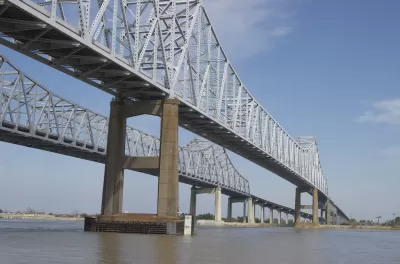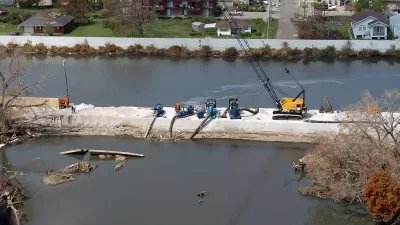Climate change and channelization have made high water levels the norm along the river. But low-lying New Orleans lies in its path, and the consequences could be monumental.

Henry Grabar writes about the rising of the Mississippi River and the threats it poses in southern Louisiana, and particularly to New Orleans. "America’s wettest 12-month period in recorded history, all those devastating floods in Nebraska, Iowa, Oklahoma, Arkansas … it is all coming down through New Orleans now, putting the world’s most ambitious infrastructure of river control to the test."
The river is setting high water records—it is eight feet higher now than it was at this time last year—and the result has been large amounts of very fast-moving water, making navigation of vessels dangerous and travel upstream slow and difficult.
The combination of weather and channelization to keep the river under control has experts worried, says Grabar. The constant stress on the aging levee system could weaken it. And the approach of hurricane season when the river is so high is a concern.
"A storm would have to hit the river mouth just so to cause a major river surge. But as the years go by, it is looking more likely that high water and a hurricane could coincide—and in turn, it becomes more important to rethink the logic of the system that sends so much water through New Orleans into the hot summer months," notes Grabar.
FULL STORY: Hell Is High Water

Study: Maui’s Plan to Convert Vacation Rentals to Long-Term Housing Could Cause Nearly $1 Billion Economic Loss
The plan would reduce visitor accommodation by 25% resulting in 1,900 jobs lost.

Alabama: Trump Terminates Settlements for Black Communities Harmed By Raw Sewage
Trump deemed the landmark civil rights agreement “illegal DEI and environmental justice policy.”

Why Should We Subsidize Public Transportation?
Many public transit agencies face financial stress due to rising costs, declining fare revenue, and declining subsidies. Transit advocates must provide a strong business case for increasing public transit funding.

Paris Bike Boom Leads to Steep Drop in Air Pollution
The French city’s air quality has improved dramatically in the past 20 years, coinciding with a growth in cycling.

Why Housing Costs More to Build in California Than in Texas
Hard costs like labor and materials combined with ‘soft’ costs such as permitting make building in the San Francisco Bay Area almost three times as costly as in Texas cities.

San Diego County Sees a Rise in Urban Coyotes
San Diego County experiences a rise in urban coyotes, as sightings become prevalent throughout its urban neighbourhoods and surrounding areas.
Urban Design for Planners 1: Software Tools
This six-course series explores essential urban design concepts using open source software and equips planners with the tools they need to participate fully in the urban design process.
Planning for Universal Design
Learn the tools for implementing Universal Design in planning regulations.
Smith Gee Studio
Alamo Area Metropolitan Planning Organization
City of Santa Clarita
Institute for Housing and Urban Development Studies (IHS)
City of Grandview
Harvard GSD Executive Education
Toledo-Lucas County Plan Commissions
Salt Lake City
NYU Wagner Graduate School of Public Service




























